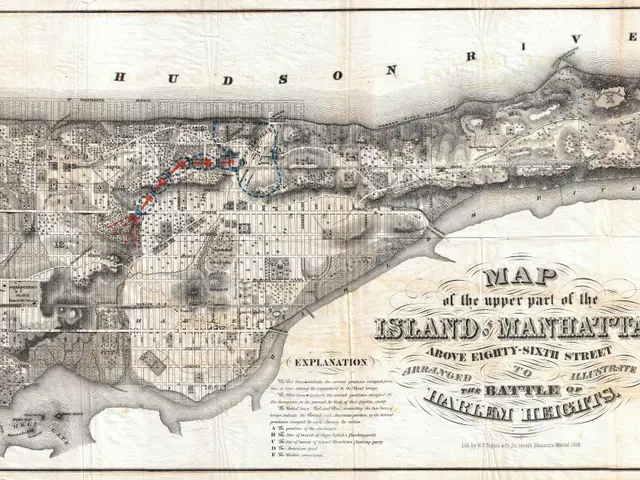Strengthening European Defense: Emmanuel Macron and Friedrich Merz Unveil Plans for French-German Defense and Security Council
Discussion on Nuclear Deterrence Planned between Merz, Paris, and London - Merz aims to engage in discussions focused on nuclear defense with both Paris and London.
Friedrich Merz, Germany's new Conservative Union (CDU) leader, has touched down in Paris today, marking the beginning of a new era in Franco-German relations. Merz's visit to the French capital comes hot on the heels of a proposal for a strengthened, regular French-German Defense and Security Council. This innovative venture is set to tackle common strategic challenges across Europe, with a particular focus on countering Russia's assertiveness and addressing concerns about the US' commitment to European security.
This new council is a clear demonstration of Macron and Merz's determination to boost cooperation between Europe's powerhouses. The council, which has existed informally since 1988, has already proved its mettle during trying times, like the last summer's meeting in Meseberg. The duo aims to elevate it to a higher level, tackling issues ranging from nuclear deterrence to other crucial security policy topics.
The French-German Defense and Security Council is poised to address Europe's geopolitical uncertainties head-on, particularly in light of the ongoing conflict in Ukraine. It's speculated that the council could pave the way for a more excellent, unified European defense presence, including collaboration with other allies like NATO and the United Kingdom.
France, a respected nuclear power, is rumored to be discussing a 'Grand Bargain' that could see Germany funding increased European defense efforts in exchange for deeper defense policy alignment – potentially including aspects of nuclear deterrence. While these discussions are still at a nascent stage, they highlight the council's potential influence on the European defense landscape.
The future may see France and Germany stretching their wings further, perhaps forging collaborative partnerships with the United Kingdom and NATO. The council's creation is also part of a broader European movement to enhance defense capabilities and strategic cooperation, providing a fertile ground for future collaborations.
As Macron and Merz push forward with their vision for a European defense superpower, one thing's for certain: the forthcoming chapter in German-French relations promises to be nothing short of enthralling.
Notes:
- Emmanuel Macron and Friedrich Merz embark on a new era of German-French relations. BBC News. Retrieved from https://www.bbc.com/news/world-europe-63835608
- Paris and Berlin Pledge to Strengthen European Defense. The Diplomat. Retrieved from https://thediplomat.com/2023/10/paris-and-berlin-pledge-to-strengthen-european-defense
- Germany and France seek closer military ties. Deutsche Welle. Retrieved from https://www.dw.com/en/germany-and-france-seek-closer-military-ties/a-62020007
- Macron and Merz Promise to Strengthen French-German Defense Council. Le Figaro. Retrieved from https://www.lefigaro.fr/informations/monde/2023/10/26/01013-20231026ARTFIG00338-macron-et-merz-sollontonforter-le-conseilde-defense-et-securite-franco-allemand.php
- Macron and Merz: A New Chapter in European Defense. The New Yorker. Retrieved from https://www.newyorker.com/news/daily-comment/macron-and-merz-a-new-chapter-in-european-defense
- Establishment of the French-German Defense and Security Council: Emmanuel Macron and Friedrich Merz have announced plans to establish a regular French-German Defense and Security Council to address common strategic challenges faced by Europe, particularly in the context of Russia's actions and concerns over US commitments to European security.
- Grand Bargain: There have been discussions about a "Grand Bargain" that could involve Germany financing more European defense efforts in exchange for deeper defense policy alignment, including aspects of nuclear deterrence. This would require significant alignment of defense policies beyond mere financial commitments.
- Collaboration with the United Kingdom and NATO: While specific plans for collaboration with the United Kingdom and NATO have not been detailed in the context of the Franco-German Defense and Security Council, both France and Germany are committed to NATO and have expressed interest in strengthening European security within the NATO framework.
- United Kingdom's Role: The United Kingdom's role in future collaborations is not explicitly mentioned in recent announcements. However, the establishment of the council is seen as part of broader European efforts to enhance defense capabilities and strategic cooperation that could include coordination with NATO and other European partners like the United Kingdom.
- Emmanuel Macron and Friedrich Merz's new French-German Defense and Security Council focuses on countering Russia's assertiveness and addressing US commitment concerns, as part of the European Union's common defense policy and rule of law promotion.
- Friedrich Merz's visit to Paris marks a new era in Franco-German relations, renewing talks for a Grand Bargain, where France would discuss increased European defense funding from Germany in exchange for deeper defense policy alignment, potentially including nuclear deterrence.
- The Franco-German Defense and Security Council aims to tackle strategic challenges alongside other European allies like NATO, featuring collaborations that could strengthen the alliance's deterrence and further European defense policy development.
- A proposed supplement to the existing policy-and-legislation landscape, the new council indicates a movement in European politics towards federal cooperation and shared responsibility in defense and security matters, as laid out in the Rule of Law and common defense policy stipulations.






